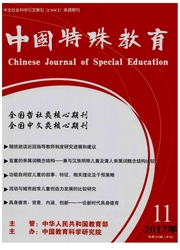

 中文摘要:
中文摘要:
手语是聋人思想沟通、社会交往的主要手段,手语失语症的出现影响聋人语言发展和社会交往。研究手语失语症大脑机制有助于更好地认识和了解手语失语症的发病原因,而探明手语失语症病因是科学认识、有效治疗手语失语症及日后康复干预和教育教学的基础。文章对手语失语症大脑机制的基本观点及相关研究进行了探讨,兼论手语加工与大脑功能可塑性,以期加深对手语失语症大脑机制的认识,了解手语失语症产生的原因,也望为聋人语言康复和干预训练以及聋人教育的发展提供有益的启发。
 英文摘要:
英文摘要:
Sign language is a major means of communication and social interactions for hearing-impaired persons, and sign language aphasia affects their langnage acquisition and social interactions. The study of the brain mechanisms helps researchers have a better understanding of the cause of sign language aphasia, which is the prerequisite for the understanding and treatment of sign language aphasia, its rehabilitation and interventions, and related education and teaching. This paper reviews the basic ideas on the brain mechanisms of sign language aphasia, sign language processing, and the brain plasticity, with a view to offering implications for sign language rehabilitation and the education for hearing-impaired persons.
 同期刊论文项目
同期刊论文项目
 同项目期刊论文
同项目期刊论文
 期刊信息
期刊信息
